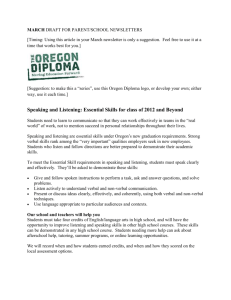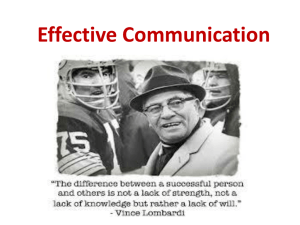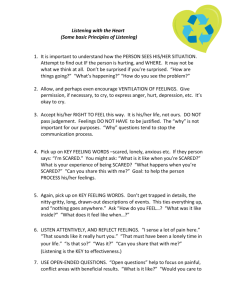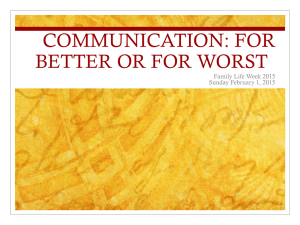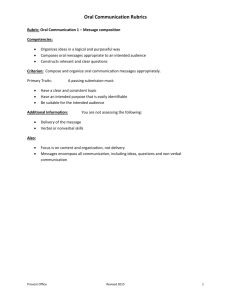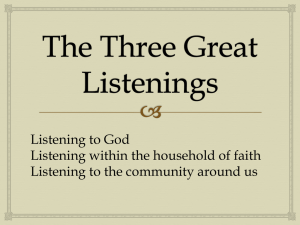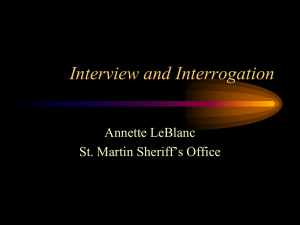3 Basics of Communication and Team Working
advertisement
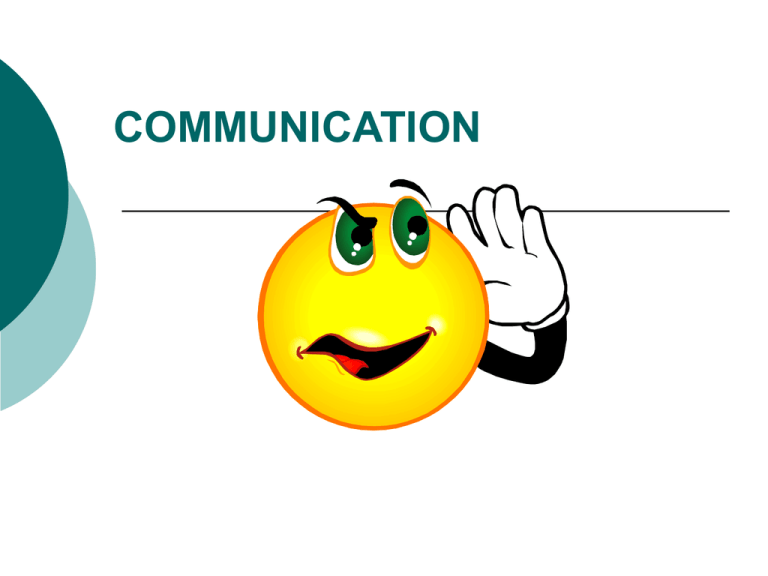
COMMUNICATION Aims of the Session Identify core communication skills Explore communication issues that you face in your daily work with patients, and their families/carers Practice ways of using communication skills to deal with difficult situations Identify the importance of team working Definition Communication is the imparting or exchange of information, ideas or feelings Not simple – complex interplay of experiences and attitudes affecting what is given and what is received Communication Verbal Non-verbal Para-verbal Environment Communication Verbal – the words we choose 7% Para verbal – how we say the words 38% account for what is perceived and understood by others Non-verbal – our body language 55% account for what is perceived and understood by others Verbal/Para-Verbal communication What you say Meaning How you say it (tone, volume, clarity) Jargon Open questions Responding appropriately Non-verbal Communication Behaviour Facial expression Gestures Eye contact Touch Listening skills Environment Privacy Find a room Draw screens Noise levels Decor Process of Communication LISTEN OR BLOCK? INFORMATION SENDER RECEIVER Behaviours which Encourage Communication Demonstration of empathy -warmth and genuineness Active listening Body language Meaningful silence Acknowledgement of strong emotion Encouragement to continue Picking up cues by use of Reflection Open questioning Clarification Examples of Open Questions “Could you tell me what the most important things are to you at the moment? Can you tell me about your current illness and how you are feeling? Who is the most significant person in your life? What fears or worries, if any do you have about the future? In thinking about the future, have you thought about where you would prefer to be cared for as your illness gets worse? What would give you the most comfort when your life draws to a close?” Horne, G., Seymour J.E. and Shepherd, K. (2006) International Journal of Palliative Nursing.12(4): 172178. Listening…… Why bother? To understand To show compassion To encourage talking To improve symptom management Therapeutic in itself Still listening? What inhibits listening? Interruptions Distractions Language barriers Blocking tactics Blocks to effective communication for HCP your own problems stress/anxiety physical environment non-verbal skills verbal skills Blocks to effective communication for patient’s/families Out of control Don’t understand Afraid Distressed No privacy Poor continuity The unknown Facing loss As HCP how do we block? Passing the buckSelective attention to cues Switching Topics Inappropriate Encouragement or Advice Premature or Closed Questions False Reassurance Giving Your Premature Problem Opinion Solving Normalising or Switching focus to Stereotyped Relatives Comments Talk about yourself Avoiding the person Having conversations with patients and families at the end of life is challenging Group Discussions - What aspect of having these conversations do you find challenging? Difficult Questions Am I dying? How long have I got? Is my mother going to get better? Difficult Questions Explore why they are asking this. For examplePatient: Am I dying? Nurse: What makes you ask that question just now? Difficult Questions Always focus on the patient and their perspective, it doesn’t matter what we think they have been told, the important thing is what they remember! Use listening skills. Difficult Questions Use reflection to check understanding and encourage the person to talk. example Patient: I just feel so afraid… Nurse: You said you feel afraid can you tell me a bit more about those feelings. Difficult Questions Use of clarification, don’t assume you understand the use of a word. Example Patient: I just feel so sick and tired all the time. Nurse: When you say sick and tired, can you describe how that feels for you. Anger Can take many forms Common reaction to ill-health by patient or family Sometimes ‘masks’ feelings of guilt, fear, stress If not addressed can escalate Anger Be safe Acknowledge emotion(s) Permission Listen to story to get as much information as possible Focus on stress/feelings Apologise Reasons Negotiate a solution Anger Talking in a private environment Listening Open body language Reflection, repetition Acknowledgement Anger Identify key areas of conflict Discuss ways these could be improved / resolved (if possible) Consider / explore other reasons for anger Patient’s Not Wanting to Talk Denial ignorance fact feeling Lack of capacity to understand Incorrect information Depression Dementia Disengagement Talking to someone else Previously dealt with – just wanting to forget Denial The function of denial is to protect the patient against distress that could be intolerable, and lead to psychological and spiritual distress Denial Common coping strategy Often misunderstood Rarely is denial ‘complete’ Level of denial can fluctuate Requires assessment & exploration Collusion Focus on the relative Feelings Strain on relationship Reasons for not being truthful Support reasons Access patients questions to relatives Suggest ‘window’ on knowledge Ask for permission to assess patient Reassure no telling Confirmation if necessary Summarising - Ensuring Effective Communication skills Warmth/genuineness Establishing rapport Listening Acknowledgement Encouragement Open questions Picking up cues Reflection Clarifying Pacing – use of silence Communication and Team Building EXAMPLE OF TEAM WORKING AT ITS VERY BEST EXAMPLE OF TEAM WORKING AT ITS WORST The way a team plays as a whole determines its success. You may have the greatest bunch of individual stars in the world, but if they don't play together, the club won't be worth a dime." -- Babe Ruth How would you describe a team? Chambers dictionary definition “A set of people working in combination”. What is Team Working Work done by a group, with an organised division of labour Co-operation Pulling together Focussing on the success of the team as a whole rather than personal achievement Each team is unique however and it's not as simple as it might seem to make teams work effectively. Group work - Team working Build the tallest tower you can using plastic cups Each team member think about their role in building the tower - Practical - Supportive - Ideas man - Leader - Other what makes a good team? What do you think makes a team work well? Good communication Good leadership Everyone feeling valued All roles filled Tolerance Everyone knowing what their role is Disharmony addressed promptly Everyone feeling that they are treated fairly Team Effectiveness We should recognise and celebrate the diversity of skills and personalities within the team, everyone is different, but everyone has something to contribute and should be valued for that contribution Recognise when different personality types balance and complement each other and embrace that (support) Make sure that everyone has the opportunity to reflect upon, and learn from their experiences…………….. Team Effectiveness Everything that needs to be done is being done, everyone pulling together Everyone is clear about why they are doing things in a certain way All the efforts of the team should be directed towards the same clear goals What goals are your ward To strive for the best outcome for your patients… Team Effectiveness Everything that needs to be done is being done, everyone pulling together Everyone is clear about why they are doing things in a certain way All the efforts of the team should be directed towards the same clear goals – (What goals) Everyone should know their role within the team and their responsibilities Responsibility and Blame Taking the Responsibility for something as opposed to taking the Blame for something are two very different things: BLAME….. Blame is NEGATIVE it diminishes you It doesn’t change what has happened And it doesn’t help you prepare for the future Responsibility…........ Responsibility is POSITIVE. It enables you to consider your actions. It lets you think about how you have acted and how you will act in the future, based upon the learning that has arisen from your experience….. In this way we learn both from our mistakes and from our successes. I’m not working at that end of the ward……….. Positive or Negative I just do what I’m told…….. Positive or Negative Individual Responsibility We all carry some responsibility within our team. In a team no one person takes responsibility for doing everything. Although the leader will have overall responsibility to ensure everything gets done, it is not the leader who does it all! Each of us has a role and is accountable. By being a responsible member of a team you have to be prepared to celebrate together when things are going well and to pull together when they aren’t……….
